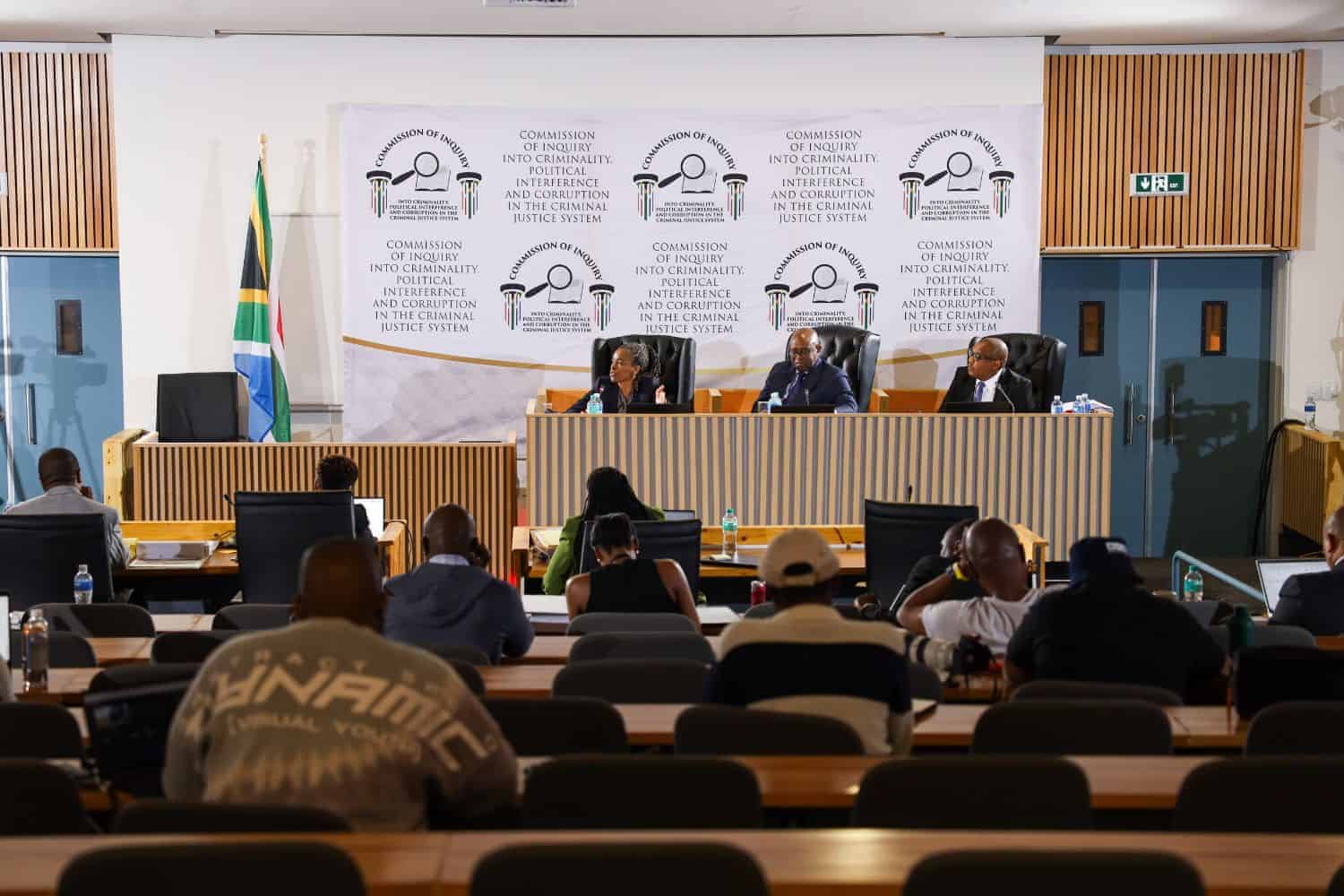Members of the PKTT survived three armed attacks without any casualties.

A former member of the “disbanded” political killings task team (PKTT) has accused fellow police officers of participating in attacks on the unit, making striking claims before the Madlanga commission.
Lieutenant Colonel Ntate Khumalo testified in Pretoria on Monday as the commission’s second witness, recounting his tenure with the PKTT.
The task team’s dissolution was ordered by Police Minister Senzo Mchunu – currently on special leave – on 31 December 2024, a decision that led KwaZulu-Natal (KZN) Police Commissioner Nhlanhla Mkhwanazi to allege deep criminal infiltration within South Africa’s security and justice structures.
The task team, however, remains in operation.
Madlanga commission hears of PKTT’s investigative approach
Khumalo, originally from the North West and unrelated to Crime Intelligence head Dumisani Khumalo, told the commission that he joined the KZN-based PKTT when it was established in 2018, eventually serving in leadership roles.
He left the unit earlier this year and moved to the head office of the South African Police Service (Saps) in Pretoria.
Explaining the team’s work, Khumalo said the PKTT’s five-pillar investigative model centred on political assassinations and connected cases, especially those linked by illegal firearms.
“Majority of the politically related cases, a tool that is commonly used is a firearm and we did recover a lot of firearms that are linked to the cases, but there is still some that are outstanding,” he said.
The witness highlighted that the task team’s mandate later expanded to cover killings of traditional leaders.
ALSO READ: ‘Ramaphosa was in agreement’: Khumalo on what Mchunu said about PKTT disbandment
According to Khumalo, the masterminds behind these crimes invest “huge money” in avoiding accountability, whether by helping suspects evade capture or by bribing individuals.
“Hitmen will try by all means to evade arrest. They will go on and even live an abnormal life of hiding for years.”
He added that the kingpins also routinely finance the legal defence of hitmen to avoid being implicated themselves.
“There’s instances whereby we are able to detect that the hitmen can’t afford a certain attorney and you’ll find that the hit orderer then pays the legal fees of the suspect [when] the accused is being arrested and taking care of their family.”
Witness intimidation is also widespread.
“Most of the time you find witnesses recanting from their original statement that they submitted.
“You go and get bystanders and they will tell you straight I didn’t see anything because they fear for their lives.”
Watch the Madlanga commission’s proceedings below:
Case docket tampering
Khumalo emphasised that motives often overlap with other criminal activities, making it crucial to determine the true reason for a killing.
“Why is the victim killed? Because that is going to answer and give you clues going forward with your investigation.”
He indicated that some victims straddle multiple roles – for instance, being both politicians and taxi business owners – resulting in cases that blur the line between political killings and taxi violence.
For traditional leaders, disputes involving livestock or land frequently “result in death”.
Some PKTT case files, he explained, had previously been handled by local police but remained unresolved, with certain cases dating back as far as 2016.
READ MORE: ‘I couldn’t understand the reasons’: Acting police minister on PKTT disbandment
Moreover, the police officer informed the commission that some information and evidence had been “tampered with” because “a lot of hands” had handled the particular case docket.
He further alleged that masterminds rely on their “financial muscle” to target investigators or even make dockets disappear.
“They know that if we mess up with the docket there won’t be clear evidence to link [them].”
Khumalo said that various groups – including taxi operators and private security – are drawn into political assassinations.
Hitmen typically rely on their employers to provide firearms, charging extra if they need to use personal weapons, while accomplices, including drivers and lookouts who track the targets’ movements, play a key role in the executions.
PKTT members survive attacks
Khumalo revealed that members of the PKTT survived three armed attacks without any casualties.
The first occurred in 2019 when the team came under fire at night in southern KZN.
“They were able to survive that even though two of them were shot at the lower part of their bodies.”
Two more incidents took place in December 2022.
The first happened in Phoenix, where a suspect opened fire on four PKTT officers at a petrol station before being “neutralised”.
READ MORE: Former police minister Bheki Cele never gave directions to PKTT, says Khumalo
The third attack, which Khumalo described as “bizarre”, resulted in three officers being shot.
The team had been working in Msinga when they noticed a vehicle trailing them after departing from a police station.
“They could see that this vehicle is following them, and they accelerated, but the vehicle continued to accelerate up until they arrive at a certain point and the passenger draws a firearm, a pistol, and starts shooting at the members.
“Members were able to return fire, and two of them were shot, but not fatally.”
Police involvement
Khumalo testified that investigations later confirmed police involvement in all three attacks.
“The matter of 2019, there was an R5 [rifle] that was used. R5 is carried or allocated to police Saps and then on the other two, definitely the member that shot our PKTT members at Phoenix, he was a member of Saps.
“On the one of Msinga, which I said is bizarre, the driver of the suspect vehicle was a police officer.
“The passenger was a member of the public, and that’s the member of the public that actually drew a firearm and shot at our members.
“And then when we conducted the investigation, the firearm he shot us with it’s a police firearm. That means a police officer handed the firearm to a member of the public to shoot them.”
NOW READ: PKTT should not have been disbanded without proper consultation, another witness says






